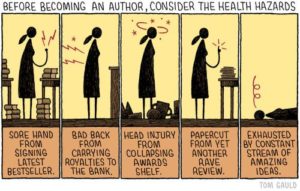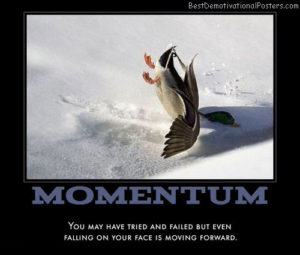National Novel Writing Month (NaNoWriMo) is a fun exercise for the professional writer as well as the dabbling beginning author wanna-be. The purpose of the event is not to hit 50K words, believe it or not. The real goal is to get people to start writing, to try to build up confidence, and to start a daily writing habit. That 50K word “goal” is just something more concrete for a beginning author to shoot for.
Personally, I think even writing one single word is a milestone since you’re now one word closer towards the completion of your novel. You’re further along than you were yesterday. It’s the effort that matters, and that’s where you should focus.
As of November 30, 2016, my total NaNoWriMo word count is 1,079,395 — over a million words. Here are some of the tips I use to get ready for the month.
Know Your November Schedule
It’s funny how many folks plan on participating in a month-long event without knowing what they’re in for. A good example to start with is Thanksgiving for those folks in the United States. Many families travel across the country to visit relatives. You may be the visitor, or you may be the destination. Understanding that you will be focused on a huge dinner with ten visitors at your table all ready to critique your interpretation of Grandma’s Super-Special Stuffing® will allow you to plan for no writing on the day before the holiday. For some crazy folks, going out the following day to battle crowds on Black Friday may be a tradition.
If you’re in college, perhaps there’s a major mid-term you will need to study for. Thinking about your day job, is there a huge project that will be due during November? You should take that into account.
Now that you have the major “distractions” identified, consider how many writing days you have left. Subtract two days for life emergencies. Now divide the number of days into 50K to see what your real daily writing goals are.
Start: 30 Days
-2 for emergencies
-3 for day job project
-1 for Black Friday sales
-2 for Thanksgiving dinner preparation and the ensuing coma from overeating
= 22 writing days
50,000 words / 22 days = 2273 words per writing day to “win” NaNoWriMo.
This is your real writing goal if you decide you’d like to reach that elusive fifty thousand word goal. If you work with this number in mind instead of the 1,667 words it says on the NaNo website, you will be better prepared to make it.
Prepare More Than One Project
I never have issues with writers block because I’m always working on multiple projects at one time. If the words won’t flow for one of them, I understand my brain is working on something that needs to be solved before continuing. When that happens I can either switch to some other project or switch to a different section of the novel. For example, maybe I’m stuck with some aspect of worldbuilding and magic in a fantasy novel. Instead of just sitting there in front of a keyboard gathering dust, I can jump forward to where the protagonist runs across the fierce bandit ogre and defeats the beast, turning it into a loyal friend.
Then again, maybe that bit of magic is so important that I can’t continue for now. No worries! Your brain will be stewing on that issue for a bit, so perhaps switch over to a space marine science fiction story and begin to write the next scene. Should the solution to your magical quandary present itself, feel free to save the sci-fi mid-battle and swap back to the fantasy.
I prepare six novels for every NaNoWriMo, all in different genres. Each one is plotted out using Scrivener, my preferred large project word processor. I also write a paragraph for each chapter describing what should be covered at a minimum. Don’t worry! When the file is prepared, I check the total words and don’t use them towards my November word count.
Don’t Erase Stuff!
If I’m banging away on my keyboard and discover the last half of a chapter won’t work because of a gaping plot hole, I never delete the words I’ve produced. Instead, I make a sub-page off of my chapter page and copy/paste the parts that don’t work. I do this because those words do count unless you delete them. Never go backwards more than a single sentence. By hanging on to those homeless words, they will still count plus you may discover they actually work elsewhere in the novel. It’s terribly frustrating to discover that you wrote the perfect two paragraphs but you nuked them…and now you can’t remember the wording you used that made the two paragraphs stand out.
If it turns out that your saved snippets only help you once, you’ll be ecstatic that you saved them.
Remember, It’s a First Draft
This probably harms more authors than anything else. New authors in particular tend to see the perfect as the enemy of the good. They keep fiddling with a sentence to make it perfect instead of continuing on. It’s a form of writers block, in my opinion, and it’s self-inflicted. You must remember that NaNoWriMo doesn’t mean National Perfectly Edited Final Draft Novel Writing Month. This is a sloppy, rough first draft. You will have plenty of time to run through it a few more times before you even think to bring in an editor, publisher, or to even self-publish. You must give yourself permission to suck and to write crap. It will be cleaned up and polished later!
Get the overall words down on the blasted page and move on. I always include extensive notes in my first drafts, such as [Research how long it would take for an iron chest to rust through in salt water.] I enclose those notes in square brackets so I can just search for them and find the answers — after November 30th. November is a writing month and not a research month. Focus!
Sometimes a new character will suddenly appear, forcing themselves into the novel and you have no say-so. Cool! Just add notes: [Bob will be joining the group as they march towards certain doom. Give him a background and a decent name.] Then move on. If you’re spending an hour discovering the perfect name for your new character, stop wasting time. Call them Bob or Sally or James or Susan…something that won’t really fit in the finished novel. You can do a search-and-replace later.
What If I Don’t Wanna Write?
This does happen on occasion. Maybe those turkey leftovers are making you feel the tryptophan blahs. If this happens, go back and see what you need to research. Google those strange subjects that make law enforcement and the CIA think you’re a serial murderer who believes in magic and loves outer space. Then take paraphrased notes (by typing, not cut and paste!) and transfer them to your novel in square brackets. Yup, those words count. Most of the time you’ll find something that sparks your brain to fight off the tryptophan and before you know it you’re back to writing your novel.
But You Said Don’t Research in November!
Yeah, I did. And when you find you’re stuck and not building your word count, don’t be shackled to some “rules” because…there are no rules when you’re writing. Heck, you can even write using horrific grammar because this is only a first draft.
Now get your butt in that chair and start writing! Thanks for reading this post, and I hope you’re set to give it a go on November 1st. Best of luck!


 One of my many medical issues involves a common writer’s ailment – carpal tunnel. When I first started getting it I did what most folks do: I ignored it. Then it evolved from a single soldier to a tank battalion running over my wrists every time I typed more than a page.
One of my many medical issues involves a common writer’s ailment – carpal tunnel. When I first started getting it I did what most folks do: I ignored it. Then it evolved from a single soldier to a tank battalion running over my wrists every time I typed more than a page. Have you ever had someone toss you a watermelon? The big ones are tough to catch because they can slip out of your hands due to momentum. Similarly, finishing a writing project and holding a copy in your hand is always a good feeling that’s tough to hang on to when you have to figure out what to write next, but what about the momentum of that event?
Have you ever had someone toss you a watermelon? The big ones are tough to catch because they can slip out of your hands due to momentum. Similarly, finishing a writing project and holding a copy in your hand is always a good feeling that’s tough to hang on to when you have to figure out what to write next, but what about the momentum of that event? Each book is a stepping stone to your writing world. If you only write one and spend your days flogging it, after a while people will almost look at you like you’re a spammer. Same thing, day after day after month after year. If you started working on the next book, after a year you’d have at least one close to finished. Some folks can have four quality books or more. Author Chris Fox has a video series where he is writing a science fiction trilogy in exactly twelve weeks. You get to see weekly updates. Last year he wrote a novel in 21 days, then turned around and pulled in a six-digit income by December 31st. All of this was documented on
Each book is a stepping stone to your writing world. If you only write one and spend your days flogging it, after a while people will almost look at you like you’re a spammer. Same thing, day after day after month after year. If you started working on the next book, after a year you’d have at least one close to finished. Some folks can have four quality books or more. Author Chris Fox has a video series where he is writing a science fiction trilogy in exactly twelve weeks. You get to see weekly updates. Last year he wrote a novel in 21 days, then turned around and pulled in a six-digit income by December 31st. All of this was documented on  Yes, this is an option. You can set your mutant giant ant story in Nevada, and they all die because they’re allergic to saguaro cactus. The problem with this is saguaros live in the Sonora Desert in Arizona.
Yes, this is an option. You can set your mutant giant ant story in Nevada, and they all die because they’re allergic to saguaro cactus. The problem with this is saguaros live in the Sonora Desert in Arizona. You could always make up an establishment, but make sure you’re vague enough that people can’t say, “Oh, that’s where DiFara’s Pizza is. He’s been there since 1965. Also known as one of the very best places to get a pizza in the galaxy.”
You could always make up an establishment, but make sure you’re vague enough that people can’t say, “Oh, that’s where DiFara’s Pizza is. He’s been there since 1965. Also known as one of the very best places to get a pizza in the galaxy.”